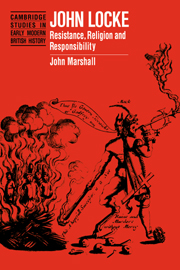Book contents
- Frontmatter
- Contents
- Acknowledgements
- List of abbreviations
- Introduction: Locke's intellectual development
- PART I RELIGION AND THE POLITICS OF TOLERATION
- PART II RESISTANCE AND RESPONSIBILITY
- PART III HERESY, PRIESTCRAFT AND TOLERATION; JOHN LOCKE AGAINST THE ‘EMPIRE OF DARKNESS’
- Conclusion
- Bibliography
- Index
- Cambridge Studies in Early Modern British History
Conclusion
Published online by Cambridge University Press: 07 January 2010
- Frontmatter
- Contents
- Acknowledgements
- List of abbreviations
- Introduction: Locke's intellectual development
- PART I RELIGION AND THE POLITICS OF TOLERATION
- PART II RESISTANCE AND RESPONSIBILITY
- PART III HERESY, PRIESTCRAFT AND TOLERATION; JOHN LOCKE AGAINST THE ‘EMPIRE OF DARKNESS’
- Conclusion
- Bibliography
- Index
- Cambridge Studies in Early Modern British History
Summary
By the time of his death, Locke was justifiably proud of his accomplishments in epistemology, political philosophy, educational theory and religious enquiry, but also had good reason for concern because many of his deepest convictions were not accepted by the vast majority of his contemporaries, several of his works were under fire, and significant issues in his thought remained unresolved. He was able to declare that he knew of no work which had explained property better than the Two Treatises. Yet they had been largely ignored, and their understanding of the principles of the Revolution of 1688–9 had been rejected by almost all of his contemporaries. They were to receive only very limited support before the end of the eighteenth century, and the support that they did receive came largely from the critics of the establishment among the theologically heterodox and republican. He had come to be fêted for his epistemology by many in France, England and Holland. The Essay was already influential, and it was to become profoundly influential in the eighteenth century in ways that are still being charted. Yet it was under significant attack for fostering heresy, and in 1703 it was suppressed by his own university, Oxford. The grounds for the demonstrability of ethics, arguably to Locke the most significant claim of the Essay, were being questioned in Locke's own lifetime in ways that at the very least he could not see how to answer adequately by demonstrating an afterlife and punishments for sin by the light of reason alone, given his agnosticism about substance and God's attributes.
- Type
- Chapter
- Information
- John LockeResistance, Religion and Responsibility, pp. 452 - 455Publisher: Cambridge University PressPrint publication year: 1994



